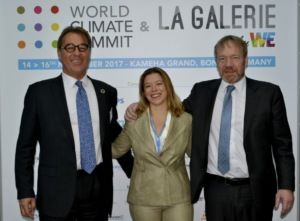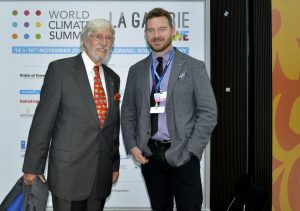US President Donald Trump might have withdrawn from the Paris Climate Accord, but Denmark and the business community are now pushing even harder for the UN goals – and especially for the Paris Climate Deal.
And as CPH POST discovered at COP23 in Bonn, they are getting help from a real-life action hero!

A driven Denmark
“In 2050, Denmark will be totally independent from fossil fuels,” predicted Finn Mortensen at COP23. As executive director of State of Green, he is in charge of co-ordinating Denmark’s transition to a green future. “It is doable!”
This would make Denmark the greenest country on the planet, and right now its ambition and know-how are badly needed.
The shockwaves caused by Trump’s attempt to kill the Paris climate deal and many other UN agreements can be felt around the world. The spirit of millions of climate activists, as well as of the scientists who monitor the alarming rise in the earth’s temperature, has reached an all-time low.
Denmark has plenty of incentive for its cause. Its capital Copenhagen is one of many coastline cities that would be flooded if current emission rates are not dramatically reduced.
But Europe’s major players are stalling. Instead of starting a global emergency plan, leaders such as German Chancellor Angela Merkel and French President Emmanuel Macron are once again agreed on postponing major funding and climate action to 2020.

Commando-in-chief
The Danish private sector is also playing a significant role.
“Some 80 percent of the financing of the Paris Agreement must come from the private sector,” contended Jens Nielsen, the founder of World Climate Limited, who connects, mobilises and motivates major players in politics, business and finance.
Trillion dollar investments are needed to reach the climate goals, urges Nielsen who in co-operation with the UN, Regions 20 (R20) and ICLEI – a union of sustainable local governments – is organising a major investment platform at COP24 in Katowice, Poland next year.
And he has some help from the commando-in-chief of R20 – its founder Arnold Schwarzenegger, the former California governor, Hollywood star and aforementioned action hero.
“The Climate Investment Platform will work with R20 attracting public and private investors for sustainable low-carbon deal flow at a sub-national level,” he explained.
“I am an action hero! I don’t wait when there are forest fires, and I won’t wait when it comes to taking action to fight climate change.”
The governator walks his talk. R20 signed letters of intent for green infrastructure projects in developing countries and presented, in collaboration with Blue Orchard Finance, a 350 million dollar target fund during COP23.
Meanwhile, Christophe Nuttall, the executive director of R20, and Armand Jost, the president of the R20 Foundation, are about to raise billions for green projects.
“We aim to support the implementation of a project pipeline of at least a 100 green infrastructures by 2020,” revealed Nuttall, who confided that such innovation and a massive shift of capital towards green technology could prevent a climate collapse.

Money is green
If the mood at Bonn was anything to go by, the private sector is clearly picking up steam in its bid to tackle climate change and build the world a better future.
Among them is Rockwool, which has invented a unique technology that is able to turn stone into a wool-like insulation.
“Cities are responsible for about a third of global carbon emissions,” explained its chief executive, Jens Birgersson.
“Our insulation enables the saving of hundreds of millions of tonnes of carbon emissions each year, and our goal is to multiply the savings by 15 times by 2030.”
Other companies such as Blackstone Energy, a Canadian company that saves massive amounts of CO2 by optimising the energy efficiency of more than 7,000 clients, and the Danish high-tech company Kamstrup are examples of a new generation of enterprises that define value by progress created for the environment.
“Money is green,” observed Jesper Daugaard, the senior vice president global marketing at Kamstrup. Every third high-tech water meter in the world already comes from the Danish co-operative.
Kamstrup’s high-tech solutions help to monitor water and energy losses and maximise the efficiency. “This way in Denmark alone precious resources and up to one billion euros can be saved every year,” added Daugaard.

Trump is CO2
It is a race against time, though, as Trump has been busy this year killing green energy projects and revitalising what his critics describe as ‘zombie-industries’, such as highly polluting coal, oil and tar sand projects.
The rise of populist leaders as well as wars and conflicts that paralyse climate action are also a challenge. But hope comes from young visionaries and scientists, such as Patrick Furlotti, the founder of Globalmania.
Together with Graciela Chichilnisky, who was awarded the Nobel Peace Prize for her carbon emission trading scheme, Furlotti co-ordinates meetings at Stanford University that result in breakthrough technology.
“We have the solutions to the world’s problems,” he contended, citing the likes of ‘Global Thermostat’, a new technology that extracts CO2 directly from the air.
Pollution is accordingly turned into cash. Scaled up and built globally, these CO2 harvesting plants could help to win the battle against global destruction – and serve the trillion dollar carbon industry. The captured CO2 can be sold and used for carbonated beverages, or turned into ultra-light material for airplanes, bio-fertilisers and building materials.

Millennially inclined
Unnoticed by the mainstream press, a scientific and financial revolution is unfolding. According to 350.org, institutions representing more than 5 trillion US dollars are now committed to divesting assets from fossil fuel.
The movement to pull out of dirty energies has doubled in size in the past two years, and green companies in Denmark will benefit from this trend – particularly as the corporate world faces more scrutiny.
The UNGSII – the UN-supported Global Sustainability Index Institute – analyses if the performance of a company is serving the UN Goals, and it would appear your balance sheet will not thank you if you’re found wanting.
Mediatenor, a Swiss-based strategic media intelligence institute, has already analysed millions of business reports and news articles for the index, and it is the belief of its founder Roland Schatz that sustainable companies are more profitable.
Why you may ask? “They don’t lose billions with scandals,” responded Schatz.
In the current crystal internet age with an incoming young generation of nature-loving, passionate, globally-connected millennials, “corpses” are hard to hide.
Consumer boycotts could kill a business. Therefore thousands of CEOs are developing a passion for the UN goals and publicly converting from sinner to saint.

No-brainer for boards
“Some 2,000 companies have already implemented an internal carbon prizing,” revealed Peter Bakker, the founder of the Swiss-based World Business Council for Sustainable Development.
“CEOs of major companies no longer ask why their business should move into the low carbon economy,” he said. “The focus in most boardrooms is currently how – and how quickly!”
While Washington DC and many world leaders appear to be paralysed by Trump’s tweets, Danish leadership and innovation is very much appreciated in the UN.
Just last week, the Danish Foreign Ministry announced a co-operation with the UN on a workshop that aims to bring more companies into the fold. The Danish development minister, Ulla Tørnæs, stated that it was critical that the business sector gets involved and sees that “sustainable development and good business go hand in hand”.
“In order to change the world, we have to change the way the world does business, where sustainability is measured transparently and is the driver of investment,” urged Michael Møller, the director general of the United Nations Office in Geneva.













